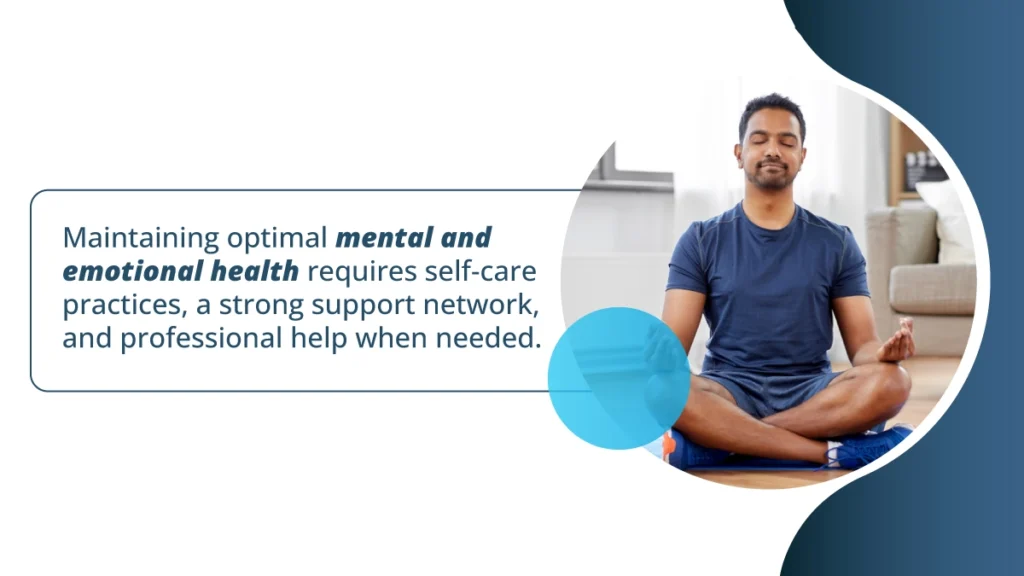Mental and emotional well-being often take a backseat in the hustle and bustle of everyday life. Yet, they are important aspects of overall health, influencing our thoughts, feelings, and behavior. Understanding the basics of mental and emotional health is essential for navigating life’s challenges.
In this article, we will delve into what mental and emotional health entails, exploring common mental health issues, factors affecting mental health, and strategies to achieve peace of mind.
Key Takeaways
Understanding mental and emotional health is essential for overall well-being in our lives. Here is what this article talks about:
- A complex mix of factors influences mental and emotional health and impacts how we cope with life’s challenges.
- Adopting a healthy lifestyle and getting professional assistance can enhance mental and emotional well-being.
- Technology offers innovative solutions, such as mental health apps, to support mental well-being conveniently.
Contact The Haven Detox-New England at (844) 933-4145 for detailed information on how we can help you achieve mental wellness.
Introduction To Mental And Emotional Health
Mental and emotional health refers to how we think, feel, and cope with life’s challenges. It’s about maintaining a positive mindset and managing stress, emotions, and relationships healthily. Good mental and emotional health allows us to function well daily, handle stress and anger effectively, and form meaningful relationships.
Ignoring mental and emotional health can result in various issues like anxiety, depression, and difficulty in managing emotions. These problems can affect our relationships, school and work performance, and overall well-being. Therefore, it’s essential to prioritize our mental and emotional health just like we do with our physical health.
Adopting a healthy lifestyle, having a strong support network, and accessing professional help are vital for maintaining good mental and emotional health. These resources provide us with the tools and support to navigate life’s challenges and build resilience. We can lead happier, more fulfilling lives by improving our mental and emotional well-being.
Common Mental And Emotional Health Issues
Mental and emotional health issues can impact anyone, regardless of age, gender, or background. Here are some common mental and emotional health problems:
Anxiety Disorders
Anxiety disorders involve excessive worry or fear that can interfere with daily life. This may include generalized anxiety disorder (GAD), panic disorder, social anxiety disorder, and specific phobias. Symptoms may vary but often include feelings of restlessness, tense muscles, and difficulty concentrating.
Mood Disorders
Mood disorders, including major depressive disorder (MDD) and bipolar disorder, affect a person’s emotional state. Depression can cause insistent feelings of sadness, hopelessness, and loss of interest in activities. Bipolar disorder involves extreme mood swings, ranging from manic highs to depressive lows.
Trauma And Stressor-Related Disorders
Trauma and stressor-related disorders occur in response to experiencing or witnessing a traumatic event. Conditions like post-traumatic stress disorder (PTSD) can result in intrusive memories, flashbacks, hypervigilance, and emotional numbness, making it challenging to cope with daily life.
Psychotic Disorders
Psychotic disorders, such as schizophrenia, involve disturbances in thinking, perception, emotions, and behavior. People with these disorders may experience hallucinations, delusions, disorganized thinking, and social withdrawal, which can significantly impact their ability to function.
Personality Disorders
Personality disorders involve long-term patterns of behavior, thoughts, and emotions that deviate from cultural expectations and cause significant distress or impairment. Conditions like borderline personality disorder (BPD) and narcissistic personality disorder (NPD) can affect relationships and daily functioning.
Neurodevelopmental Disorders
Neurodevelopmental disorders affect the brain’s development and can impact behavior, communication, and social interaction. Conditions such as autism spectrum disorder (ASD), attention-deficit/hyperactivity disorder (ADHD), and intellectual disabilities fall under this category.
Substance Use Disorders (SUD)
Substance use disorders (SUDs) occur when the use of alcohol or drugs leads to significant impairments or distress. This can include addiction to substances like alcohol, opioids, cocaine, or prescription medications. SUDs can have profound effects on physical health, relationships, and overall well-being.
Understanding these mental disorders and seeking appropriate treatment can help individuals manage symptoms and enhance their quality of life.

Factors Affecting Mental And Emotional Health
Our mental and emotional health can be influenced by various factors that interact in multifaceted ways. Let’s explore some of the key factors:
Biological Factors
Biological factors include genetics, brain chemistry, and physical health. Our genes can influence our predisposition to certain mental health conditions, while imbalances in brain chemicals can affect mood and behavior. Physical health conditions, such as chronic illness, can also impact our emotional and mental states.
Psychological Factors
Psychological factors encompass our thoughts, emotions, beliefs, and coping strategies. Our past experiences, personality traits, and cognitive patterns significantly shape our mental and emotional well-being. How we perceive and interpret events can greatly influence our psychological health.
Environmental Factors
Environmental factors refer to our surroundings, including our home, workplace, community, and social support networks. Positive environments that foster safety, stability, and social connection promote mental and emotional well-being, while negative environments can result in stress, low self-esteem, and mental health challenges.
Lifestyle Factors
Lifestyle factors encompass our habits and choices related to diet, exercise, sleep, substance use, and recreational activities. Embracing healthy lifestyle habits can have a positive influence on our mental and emotional health, while unhealthy habits can contribute to increased stressful feelings and vulnerability to mental health problems.
We can proactively improve our mental and emotional well-beingby addressing these various factors.
Strategies For Improving Mental And Emotional Health
Mental and emotional health are critical parts of our well-being, and various strategies exist to enhance them. Let’s explore the common ones:
Self-Care Practices
Self-care practices involve activities that nourish the mind, body, and spirit. This can include mindfulness meditation, deep breath exercises, journaling, spending time in nature, engaging in hobbies, and practicing gratitude. Prioritizing self-care helps reduce chronic stress, increase self-awareness, and enhance emotional regulation.
Lifestyle Changes
Making lifestyle changes can significantly impact mental and emotional health. This includes adopting a balanced diet, engaging in regular exercise, getting enough sleep daily, and avoiding harmful substances like drugs and alcohol. Healthy lifestyle habits contribute to better mood regulation and overall emotional resilience.
Therapeutic Interventions
Therapeutic interventions, such as psychotherapy, provide a safe space to explore and address underlying issues contributing to mental or emotional distress. Cognitive-behavioral therapy (CBT), dialectical behavior therapy (DBT), and mindfulness-based approaches are effective in managing conditions like anxiety, depression, and trauma.
Medical Treatment
In some scenarios, medical treatment may be required to manage mental health disorders. This can include medications prescribed by a healthcare professional and innovative treatments like transcranial magnetic stimulation (TMS). Working closely with a qualified healthcare provider is vital to determine the most suitable treatment plan.
Support Systems
Building a strong support system is crucial for maintaining good mental and emotional health. This might include friends, family members, mental health support groups, or online communities. Surrounding yourself with others who understand and care about you can provide comfort, encouragement, and perspective during difficult times.
Implementing these strategies can enhance mental and emotional health, leading to a happier and more fulfilling life.
Using Technology To Improve Mental Well-being
In today’s world, technology plays a crucial part in improving mental well-being through various avenues. Let’s explore some of them:
Mental Health Apps
Mental health apps provide convenient access to various tools and resources for managing stress, anxiety, depression, and other mental health concerns. With features like mood tracking, guided meditation, and CBT exercises, these apps empower individuals to take charge of their mental health anytime, anywhere.
Teletherapy And Online Counseling
Teletherapy and online counseling sessions connect individuals with licensed therapists and counselors through video calls or messaging. This approach eliminates barriers like transportation and allows for flexible scheduling, ensuring people can receive support comfortably from their homes.
Virtual Reality (VR) Therapy
Virtual reality therapy creates immersive environments to treat various serious mental illnesses. By simulating scenarios and offering exposure therapy, VR provides a safe space for individuals to confront their fears and anxieties. This technology shows promising results in treating phobias, PTSD, and anxiety disorders.
Online Support Communities
Online support communities bring together individuals facing similar challenges to share experiences and offer mutual support. These communities provide a sense of belonging and understanding, reducing feelings of isolation. Whether through forums, chat groups, or social media platforms, these communities foster connections and promote healing.
By leveraging technology in these ways, individuals can empower themselves to prioritize and maintain their mental well-being.
Frequently Asked Questions (FAQ)
How can I improve my mental and emotional health?
Improving mental and emotional health involves simple but powerful steps:
- Sleep well, eat nutritious food, and engage in physical activity regularly.
- Practice mindfulness meditation to still your mind and manage stressful situations.
- Build a support network of friends and family you can talk to openly.
- Set realistic goals and cheer your accomplishments, no matter how small.
- Limit exposure to negative influences, like excessive screen time or toxic relationships.
- Finally, seek professional help if needed, such as therapy or counseling.
By taking these steps, you can cultivate a healthier and happier mind and heart.
What is good emotional health?
Good emotional health means being able to understand and manage your feelings. It involves feeling generally content and confident, even when facing challenges. It is the confidence and hope that you can handle any challenges that life may throw your way. It is not always being optimistic or not having negative thoughts at all; it’s more about managing them well.
Good emotional health involves forming and maintaining healthy relationships, communicating effectively, and coping with difficult situations in a healthy way. It also means being aware of and respecting personal and interpersonal boundaries. It’s about resilience, the ability to bounce back from setbacks, and a sense of purpose and fulfillment. Overall, emotional wellness allows you to enjoy life to the fullest.
Achieve Mental Wellness At The Haven Detox-New England
Are you feeling overwhelmed with mental health struggles? You’re not alone. At The Haven Detox-New England, we help you find peace and support in a safe, residential rehab setting.
Our comprehensive mental health treatment services blend evidence-based therapies, medications, and holistic approaches to provide you the care you deserve. We also understand that mental and emotional issues and substance abuse often go hand in hand, which is why our team of mental health professionals also offers dual diagnosis support for those facing these challenges simultaneously.Take the first step towards a brighter future. Call (844) 933-4145 to learn how our evidence-based treatments can support you on your path to good mental health.




